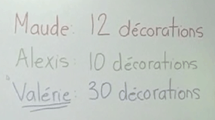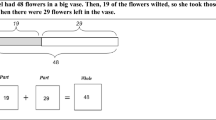Abstract
We propose to assess conceptual knowledge of mathematical notions by having recourse to isomorphic word problems. We assumed that failing to solve isomorphic problems is an indicator of lack of conceptual knowledge. To reach these conclusions, two experiments were conducted among 4th and 5th grade students. In experiment 1, each student had to solve one isomorphic word problem allowing two solving strategies. Results from experiment 1 showed that semantic context promoted a one-sided perspective, constraining the strategies used. The second experiment questioned if the strategy choices by students reflected a lack of procedural knowledge or difficulty in conceptual knowledge. Students solved several problems with the explicit task of proposing two strategies. Results showed that students struggled to identify the conceptual structure of the problems: they changed their strategy depending on semantic contexts, and did not succeed in adopting two encodings for the same problem. This lack of flexibility does not reflect weak procedural knowledge but difficulties in conceptual knowledge. Once conceptual knowledge is characterized as the ability to get over dependence on semantic context, using word problems as assessment tools for conceptual development opens up educational perspectives.
Similar content being viewed by others
Notes
F-Nb/S-Price problems is an abbreviation for Factor–Number-of-elements/Summands–Price problems. This type of abbreviation will be used for each problem.
References
Baroody, A. J. (2003). The development of adaptive expertise and flexibility: The integration of conceptual and procedural knowledge. In A. J. Baroody & A. Dowker (Eds.), The development of arithmetic concepts and skills: Constructing adaptive expertise (pp. 1–34). Mahwah, NJ: Erlbaum.
Baroody, A. J., Feil, Y., & Johnson, A. R. (2007). An alternative reconceptualization of procedural and conceptual knowledge. Journal for Research in Mathematics Education, 38(2), 115–131.
Bassok, M., Chase, V. M., & Martin, S. A. (1998). Adding apples and oranges: Alignment of semantic and formal knowledge. Cognitive Psychology, 35(2), 99–134.
Bassok, M., & Olseth, K. L. (1995). Object-based representations: Transfer between cases of continuous and discrete models of change. Journal of Experimental Psychology: Learning, Memory, and Cognition, 21(6), 1522–1538.
Begolli, K. N., & Richland, L. E. (2016). Teaching mathematics by comparison: Analog visibility as a double-edged sword. Journal of Educational Psychology, 108(2), 194.
Bell, A., Swan, M., & Taylor, G. (1981). Choice of operation in verbal problems with decimal numbers. Educational Studies in Mathematics, 12(4), 399–420.
Bisanz, J., & LeFevre, J. A. (1992). Understanding elementary mathematics. In J. I. D. Campbell (Ed.), The nature and origins of mathematical skills (pp. 113–136). Amsterdam: Elsevier Science Publisher.
Bisanz, J., Watchorn, R. P., Piatt, C., & Sherman, J. (2009). On “understanding” children’s developing use of inversion. Mathematical Thinking and Learning, 11(1–2), 10–24.
Brissiaud, R. (1994). Teaching and development: Solving “missing addend” problems using subtraction. European Journal of Psychology of Education, 9(4), 343–365.
Brissiaud, R., & Sander, E. (2010). Arithmetic word problem solving: A situation strategy first framework. Developmental Science, 13(1), 92–107.
Canobi, K. H. (2009). Concept–procedure interactions in children’s addition and subtraction. Journal of Experimental Child Psychology, 102(2), 131–149.
Carlson, S. M., Moses, L. J., & Breton, C. (2002). How specific is the relation between executive function and theory of mind? Contributions of inhibitory control and working memory. Infant and Child Development, 11(2), 73–92.
Carpenter, T. P., Franke, M. L., Jacobs, V. R., Fennema, E., & Empson, S. B. (1998). A longitudinal study of invention and understanding in children’s multidigit addition and subtraction. Journal for Research in Mathematics Education, 29(1), 3–20.
Carpenter, T. P., Franke, M. L., & Levi, L. (2003). Thinking mathematically: Integrating arithmetic and algebra in elementary school. Portsmouth, NH: Heinemann.
Coquin-Viennot, D., & Moreau, S. (2003). Highlighting the role of the episodic situation model in the solving of arithmetical problems. European Journal of Psychology of Education, 18(3), 267–279.
Crooks, N. M., & Alibali, M. W. (2014). Defining and measuring conceptual knowledge in mathematics. Developmental Review, 34(4), 344–377.
De Corte, E., Verschaffel, L., & de Win, L. (1985). Influence of rewording verbal problems on children’s problem representations and solutions. Journal of Educational Psychology, 77(4), 460–470.
Deák, G. O., & Wiseheart, M. (2015). Cognitive flexibility in young children: General or task-specific capacity? Journal of Experimental Child Psychology, 138, 31–53.
Ding, M., & Li, X. (2014). Transition from concrete to abstract representations: The distributive property in a Chinese textbook series. Educational Studies in Mathematics, 87(1), 103–121.
Fischbein, E. (1989). Tacit models and mathematical reasoning. For the learning of mathematics, 9(2), 9–14.
Friedman, N. P., Miyake, A., Young, S. E., DeFries, J. C., Corley, R. P., & Hewitt, J. K. (2008). Individual differences in executive functions are almost entirely genetic in origin. Journal of Experimental Psychology: General, 137(2), 201–225.
Gamo, S., Sander, E., & Richard, J.-F. (2010). Transfer of strategy use by semantic recoding in arithmetic problem solving. Learning and Instruction, 20(5), 400–410.
Gilmore, C., Keeble, S., Richardson, S., & Cragg, L. (2015). The role of cognitive inhibition in different components of arithmetic. ZDM, 47(5), 771–782.
Greer, B. (1997). Modelling reality in mathematics classrooms: The case of word problems. Learning and Instruction, 7(4), 293–307.
Gros, H., Sander, E., & Thibaut, J. P. (2019). When masters of abstraction run into a concrete wall: Experts failing arithmetic word problems. Psychonomic Bulletin & Review, 26(5), 1738–1746.
Gvozdic, K., & Sander, E. (2020). Learning to be an opportunistic word problem solver: Going beyond informal solving strategies. ZDM, 23(141), 1–13.
Hiebert, J., & Lefevre, P. (1986). Conceptual and procedural knowledge in mathematics: An introductory analysis. Conceptual and Procedural Knowledge: The Case of Mathematics, 2, 1–27.
Hudson, T. (1983). Correspondences and numerical differences between disjoint sets. Child Development, 54(1), 84–90.
Inoue, N. (2005). The realistic reasons behind unrealistic solutions: The role of interpretive activity in word problem solving. Learning and Instruction, 15(1), 69–83.
Kintsch, W., & Greeno, J. G. (1985). Understanding and solving word arithmetic problems. Psychological Review, 92(1), 109–120.
Klein, A. S., Beishuizen, M., & Treffers, A. (1998). The empty number line in Dutch second grades: Realistic versus gradual program design. Journal for Research in Mathematics Education, 29(4), 443–464.
Lakoff, G., & Núñez, R. (2000). Where mathematics comes from. How the embodied mind brings mathematics into being. New York, NY: Basic Books.
Pintrich, P. R. (2002). The role of metacognitive knowledge in learning, teaching, and assessing. Theory Into Practice, 41(4), 219–225.
Prather, R. W., & Alibali, M. W. (2009). The development of arithmetic principle knowledge: How do we know what learners know? Developmental Review, 29(4), 221–248.
Reusser, K. (1990). From text to situation to equation: Cognitive simulation of understanding and solving mathematical word problems. In H. Mandl, E. De Corte, N. Bennet, & H. F. Friedrich (Eds.), Learning and instruction, European research in an international context, Vol. II. New York, NY: Pergamon Press.
Reusser, K., & Stebler, R. (1997). Every word problem has a solution—The social rationality of mathematical modeling in schools. Learning and Instruction, 7(4), 309–327.
Richland, L. E., Stigler, J. W., & Holyoak, K. J. (2012). Teaching the conceptual structure of mathematics. Educational Psychologist, 47(3), 189–203.
Riley, M. S., Greeno, J. G., & Heller, J. I. (1983). Development of children’s problem solving ability in arithmetic. In H. P. Cinsburg (Ed.), The development of mathematical thinking. New York, NY: Academic Press.
Rittle-Johnson, B. (2017). Developing mathematics knowledge. Child Development Perspectives, 11(3), 184–190.
Rittle-Johnson, B., & Schneider, M. (2015). Developing conceptual and procedural knowledge of mathematics. In R. C. Kadosh & A. Dowker (Eds.), Oxford handbook of numerical cognition (pp. 1118–1134). Oxford, UK: Oxford University Press.
Rittle-Johnson, B., Schneider, M., & Star, J. R. (2015). Not a one-way street: Bidirectional relations between procedural and conceptual knowledge of mathematics. Educational Psychology Review, 27(4), 587–597.
Rittle-Johnson, B., & Siegler, R. S. (1998). The relation between conceptual and procedural knowledge in learning mathematics: A review. In Studies in developmental psychology. The development of mathematical skills (pp. 75–110). Hove, UK: Psychology Press Taylor & Francis.
Rittle-Johnson, B., Siegler, R. S., & Alibali, M. W. (2001). Developing conceptual understanding and procedural skill in mathematics: An iterative process. Journal of Educational Psychology, 93(2), 346–362.
Rittle-Johnson, B., & Star, J. R. (2007). Does comparing solution methods facilitate conceptual and procedural knowledge? An experimental study on learning to solve equations. Journal of Educational Psychology, 99(3), 561–574.
Robinson, K. M. (2017). The understanding of additive and multiplicative arithmetic concepts. In Acquisition of complex arithmetic skills and higher-order mathematics concepts (pp. 21–46). Elsevier Academic Press.
Robinson, K. M., & Dubé, A. K. (2013). Children’s additive concepts: Promoting understanding and the role of inhibition. Learning and Individual Differences, 23, 101–107.
Robinson, K. M., & Ninowski, J. E. (2003). Adults’ understanding of inversion concepts: How does performance on addition and subtraction inversion problems compare to performance on multiplication and division inversion problems? Canadian Journal of Experimental Psychology/Revue canadienne de psychologie expérimentale, 57(4), 321–330.
Schneider, M., Rittle-Johnson, B., & Star, J. R. (2011). Relations among conceptual knowledge, procedural knowledge, and procedural flexibility in two samples differing in prior knowledge. Developmental Psychology, 47(6), 1525–1538.
Selter, C., Prediger, S., Nührenbörger, M., & Hußmann, S. (2012). Taking away and determining the difference—a longitudinal perspective on two models of subtraction and the inverse relation to addition. Educational Studies in Mathematics, 79(3), 389–408.
Star, J. R. (2005). Reconceptualizing procedural knowledge. Journal for Research in Mathematics Education, 36(5), 404–411.
Star, J. R., & Newton, K. J. (2009). The nature and development of experts’ strategy flexibility for solving equations. ZDM, 41(5), 557–567.
Star, J. R., & Rittle-Johnson, B. (2008). Flexibility in problem solving: The case of equation solving. Learning and Instruction, 18(6), 565–579.
Thevenot, C., & Oakhill, J. (2005). The strategic use of alternative representations in arithmetic word problem solving. The Quarterly Journal of Experimental Psychology Section A, 58(7), 1311–1323.
Torbeyns, J., Peters, G., De Smedt, B., Ghesquière, P., & Verschaffel, L. (2016). Children's understanding of the addition/subtraction complement principle. British Journal of Educational Psychology, 86(3), 382–396.
Verschaffel, L., Luwel, K., Torbeyns, J., & Van Dooren, W. (2009). Conceptualizing, investigating, and enhancing adaptive expertise in elementary mathematics education. European Journal of Psychology of Education, 24(3), 335–359.
Verschaffel, L., Luwel, K., Torbeyns, J., & Van Dooren, W. (2011). Analyzing and Developing Strategy Flexibility in Mathematics Education. In J. Elen, E. Stahl, R. Bromme, & G. Clarebout (Eds.), Links Between Beliefs and Cognitive Flexibility: Lessons Learned (pp. 175–197). Dordrecht, the Netherlands: Springer.
Verschaffel, L., Torbeyns, J., De Smedt, B., Luwel, K., & Van Dooren, W. (2007). Strategy flexibility in children with low achievement in mathematics. Educational and Child Psychology, 24(2), 16–27.
Vicente, S., Orrantia, J., & Verschaffel, L. (2007). Influence of situational and conceptual rewording on word problem solving. British Journal of Educational Psychology, 77(4), 829–848.
Ziegler, E., & Stern, E. (2016). Consistent advantages of contrasted comparisons: Algebra learning under direct instruction. Learning and Instruction, 41, 41–51.
Acknowledgments
We thank all students and teachers for their participation. We are also grateful to the experimenter Vincent Tambourin and the pedagogical advisor Arbya Eichi.
Funding
This research was supported in part by a National Research Agency Grant ANR-06-APPR-015 and in part by a grant from France’s “Programme d’Investissements d’Avenir” (ANRU/DSDP/D14-2780).
Author information
Authors and Affiliations
Corresponding author
Additional information
Publisher’s note
Springer Nature remains neutral with regard to jurisdictional claims in published maps and institutional affiliations.
Rights and permissions
About this article
Cite this article
Scheibling-Sève, C., Pasquinelli, E. & Sander, E. Assessing conceptual knowledge through solving arithmetic word problems. Educ Stud Math 103, 293–311 (2020). https://doi.org/10.1007/s10649-020-09938-3
Published:
Issue Date:
DOI: https://doi.org/10.1007/s10649-020-09938-3




